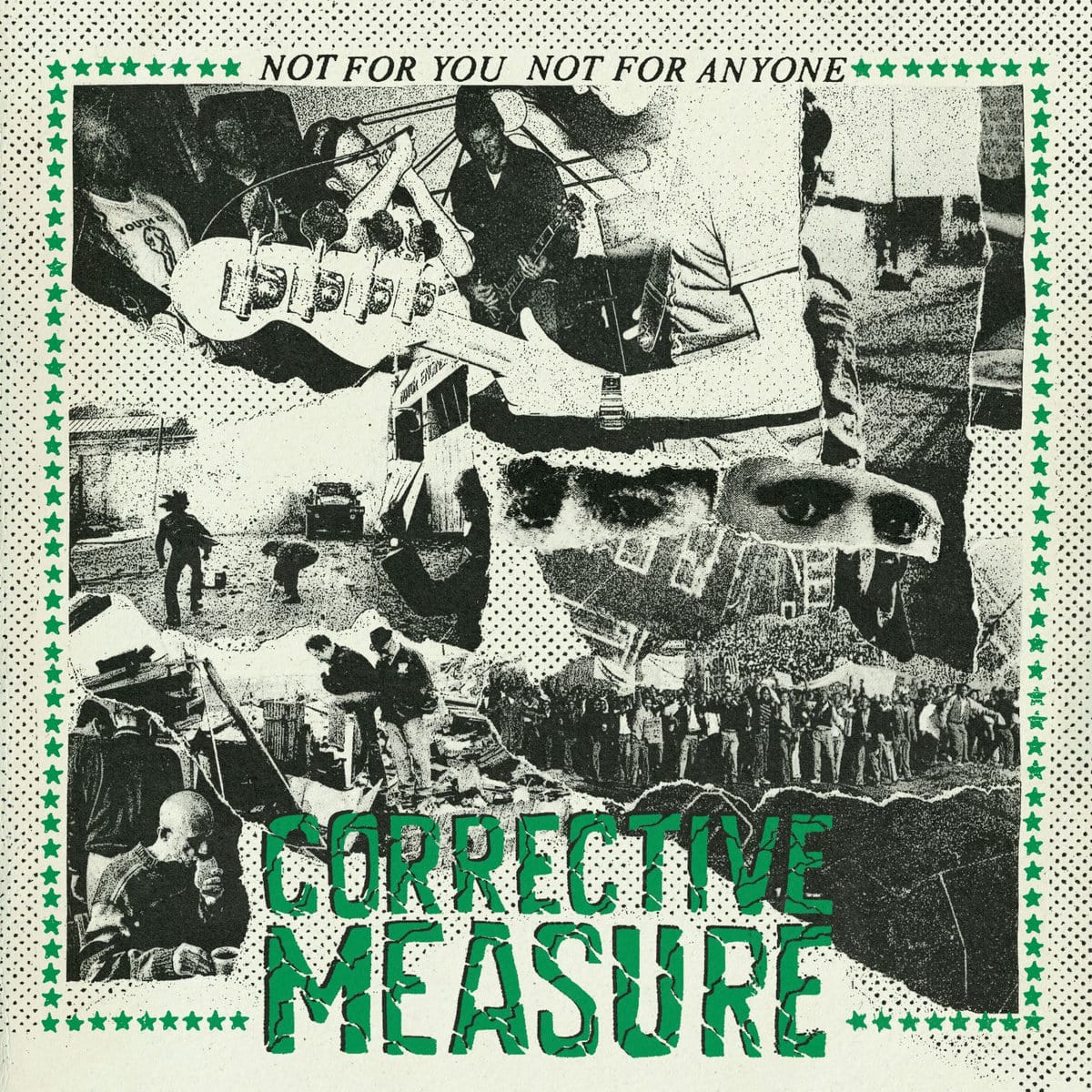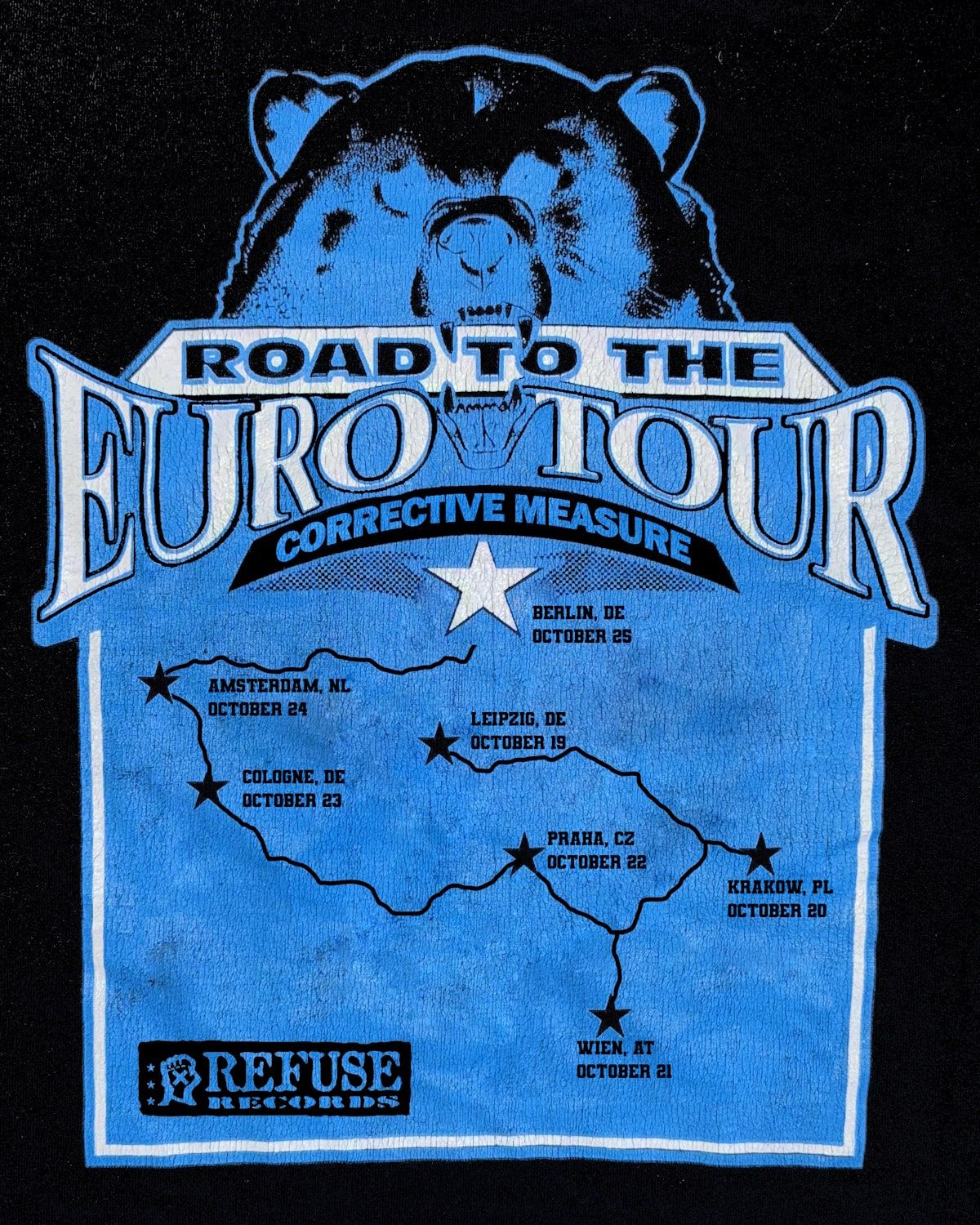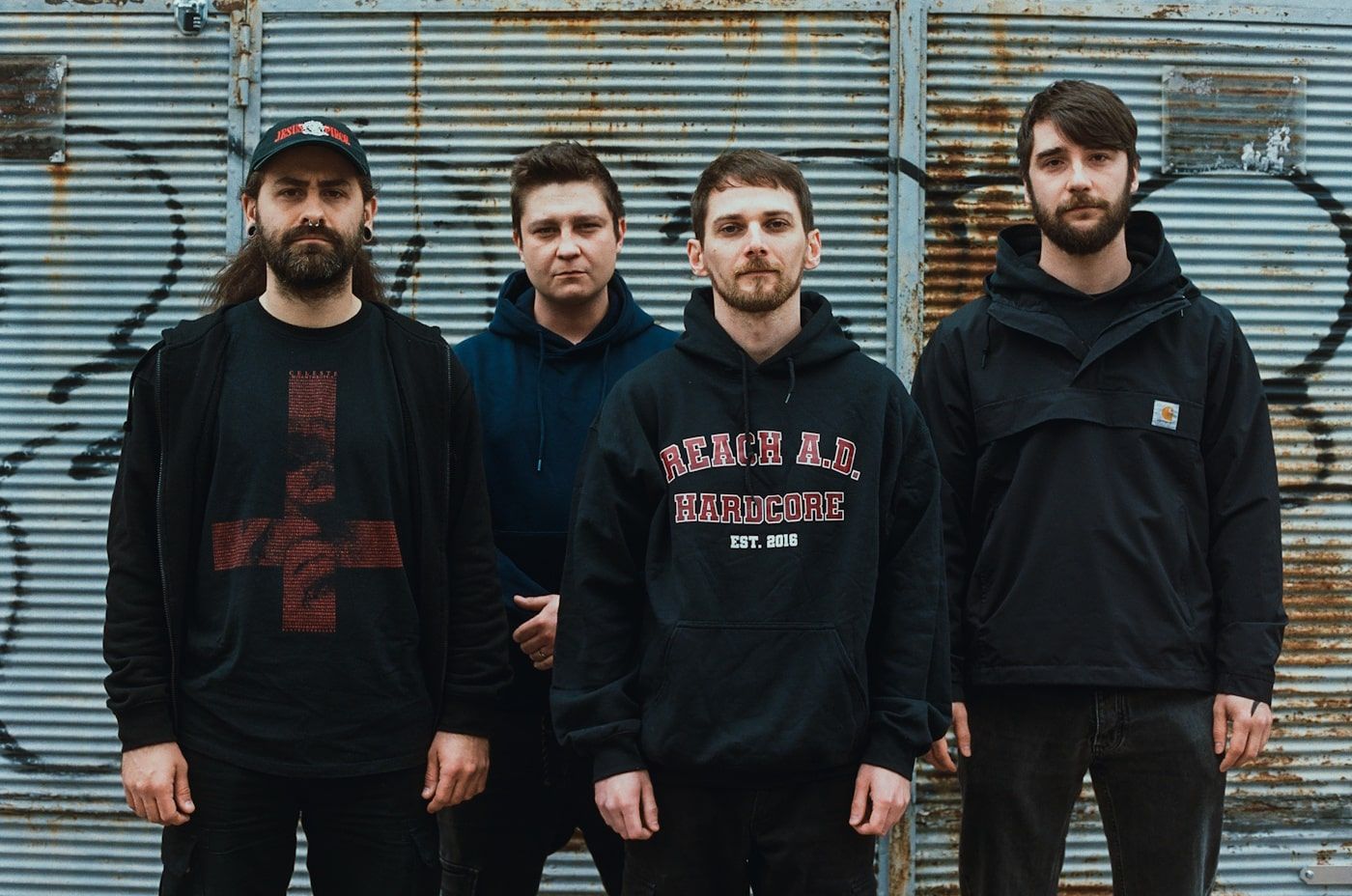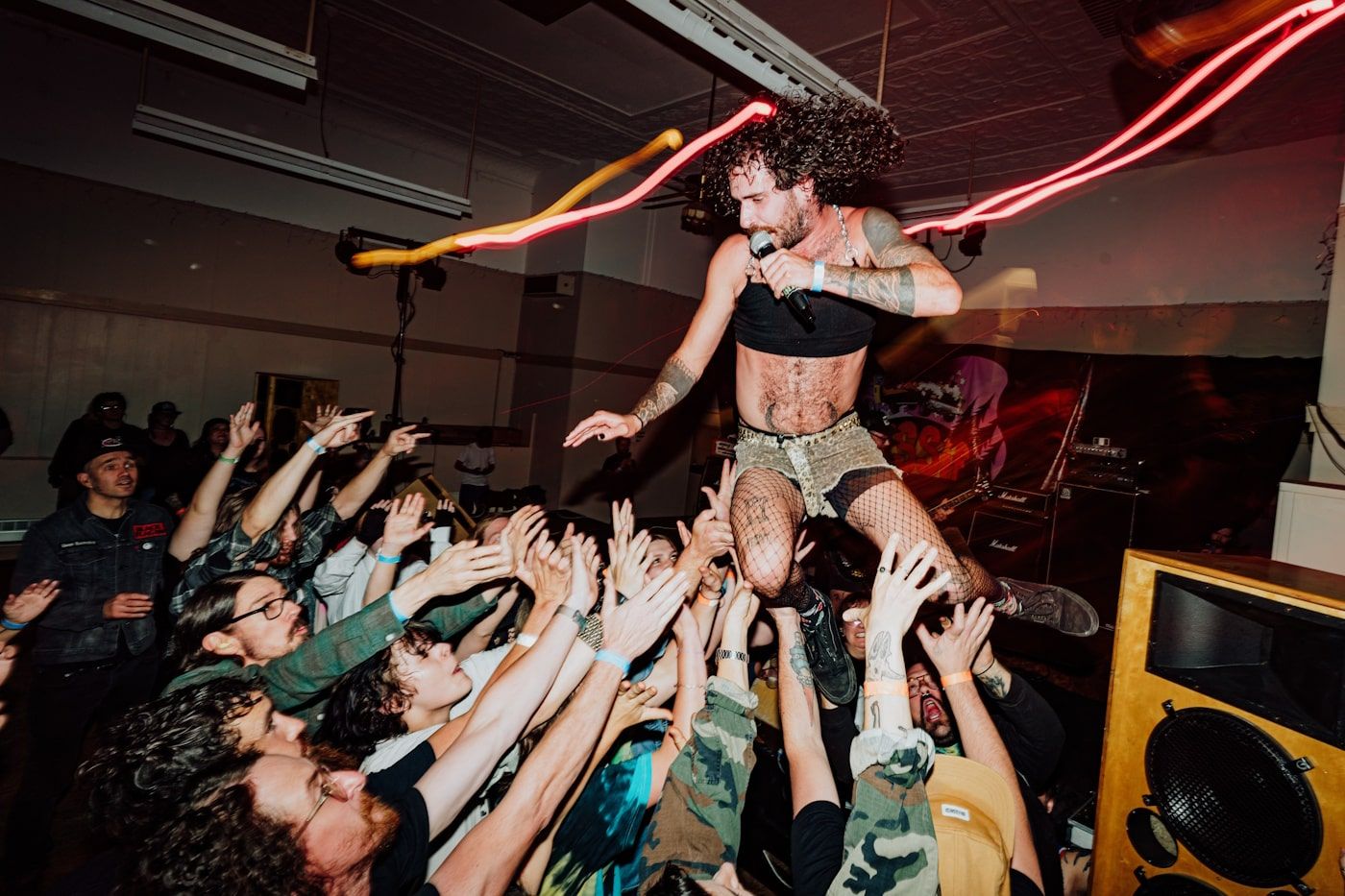There’s nothing romantic in breaking your foot twenty seconds into your first set back after seven years, or in driving a few hundred miles to record a 12” with barely-rehearsed songs and borrowed gear. But that’s where the clarity came in.
CORRECTIVE MEASURE knoww this is what it takes—no illusions, no perfect conditions, just a reason to do it and a need to say something real. Their new LP, Not For You, Not For Anyone, is about using the same blunt tools—fast riffs, shouted truths, and NYHC-level urgency—to carve out a different kind of presence in a scene they no longer take for granted.
It started in Bangor, Maine
CORRECTIVE MEASURE was formed a decade ago as a side-hustle joke between friends. They had no grand ideas, just a Madball-riff here, a Straight Ahead lyric reference there, and a DIY drive that came from growing up in a scene that booked its own shows and built its own mythologies. That scene revolved around places like the Kave and people like Kathy Kave, where inclusivity wasn’t aesthetic—it was survival.
Then it stopped.
Geography got in the way. One of them moved to DC, and without new songs on deck, the band folded quietly. There was no “we’ll be back.” Just life moving forward. A few side projects happened, a lot didn’t. Someone got into skydiving. Someone else into hydrofoiling. But the thing that kept nagging was the lack of that one thing—the thing that makes you feel mentally young, sharp, present. That absence grew heavier over time.
A new chapter
When CORRECTIVE MEASURE did come back, it wasn’t to relive anything. It was to re-engage, this time with intent. The LP, now out on Refuse Records, puts anti-violence at its center—but not in the broad, bumper-sticker way.
在 Instagram 查看这篇帖子
These are lyrics about what it means to live in the U.S. with access to healthcare determined by worth, what it means to grow up in a conservative Christian household while punk music is unlearning everything you’ve been told. Songs like “Right to Be” and “Two Sides Same Coin” carry personal weight because they interrogate systems, not people.
The message isn’t just: don’t fight. It’s: fight better.
The band today is a reshaped unit. Christian and Adam are back. Seymour moved to Florida, and in stepped Pat and Brandon. The band now balances between the old spark of ’80s hardcore and a sharper sense of purpose. There’s no fantasy about going full-time. Just a commitment to show up when it matters, to speak when they have the mic, and to make sure no one mistakes where they stand.
And where they stand is clear: against performative kindness, against moral fraudulence in religion, for trans rights, and against the genocide in Gaza.
The title of the record channels refusal. Not for you, if your motives are rotten. Not for anyone, if it’s violence you bring.
In the full interview below, the band speaks candidly about the long pause, their ideological shifts, how hydrofoiling connects to hardcore (sort of), their renewed Maine scene, and what keeps the flame alive a decade later.
What was going on with CORRECTIVE MEASURE before that 8-year gap? How did things look in the early phase of the band? Tell us a bit about your early days story.
Hey Karol! First off, thanks so much for taking the time to talk to us and listen to our music. Corrective Measure started 10 years ago this October, and we were active for a little less than two years. After our demo, we released a 7″ on Refuse Records (EU) and Atomic Action (US) and got to do some really cool stuff in 2016, like a week-long tour with Life of Reilly, Edge Day 2016, and Not Dead Yet Fest in Toronto.
The band started as sort of a joke instrument swap while practicing for another band that Adam, Christian, Seymour and I were doing at the time, so just to have it get any traction at all and for us to be able to create lifelong memories with it was awesome.
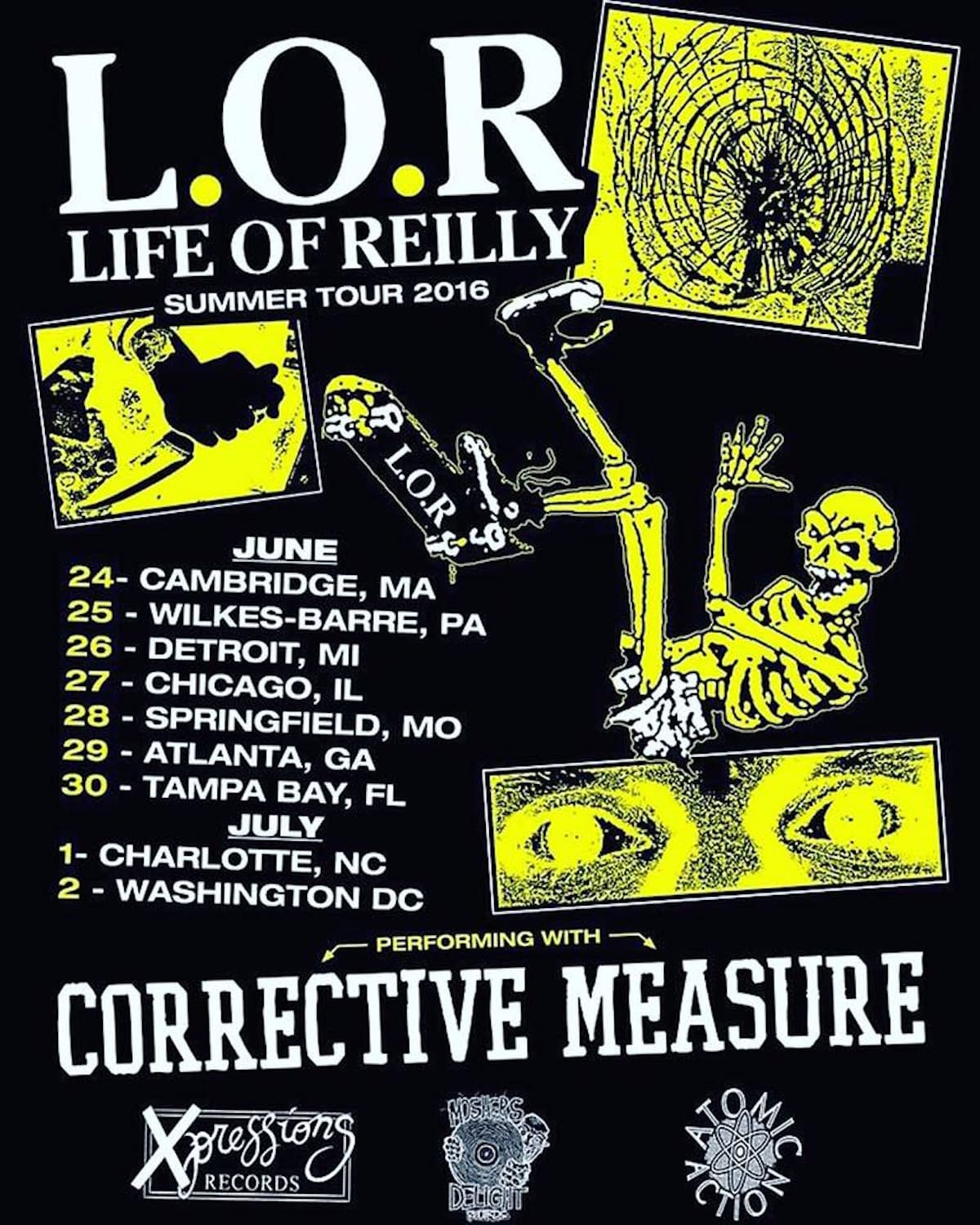
Was there a moment or situation that marked the pause, or was it more of a slow fade?
It was a pretty abrupt ending caused by me moving from Maine to DC. A couple months after I moved, I booked Give, Protester and Line of Sight in Bangor (where we are from), and flew up from DC so we could open the show.
Those were three really inspirational bands for me, so getting to play with them, and also realizing the logistics of trying to play a show while I was living in DC, made that feel like a pretty natural time to call it quits. We hadn’t written any new music so that made it easy, it didn’t really feel like we were leaving something unfinished and I think we all agreed that we’d gotten a lot more out of the band than any of us could have imagined.
What were you all involved in during that break—other bands, life stuff, anything that kept your fire burning or shifted your focus?
Christian and Seymour started an awesome MEHC band called the Langoliers, and I played in a DC band called Ultimate briefly with one of our best friends, Zech, who is also from Maine. Ultimate did a week-long tour in 2017 or 2018 and that definitely stayed in the back of my mind as a reminder of how fun it is to be in a band with your friends.
Seymour got real into skydiving and Christian got real into hydrofoiling. Like really into it. If anyone reading this happens to love hardcore music and foiling, hit up Christian on IG @highlineshapes and you’ll make his day and probably a new best friend.
Did any of those side projects or different scenes you touched during that time end up influencing how you came back to CORRECTIVE MEASURE?
This is a good question, I find myself thinking a lot about what influenced the beginning of Corrective Measure versus what has influenced us trying it again, because I feel that they’re two completely different things.
The band started purely as an homage to DC hardcore at the time and everyone that I had met while subletting a room down there in 2014. Because of that sort of “I have to start a band now” mentality after experiencing DCHC and returning to Maine, and also being a lot younger and more immature, there wasn’t really a grand idea behind the band. It was all very disorganized and chaotic… ripping off Madball shirts and Agnostic Front riffs, having no real inspiration for lyrics so just cramming as many Straight Ahead song title references into a song as I could… but I feel like that also perfectly captures where I was at that point in my life.
For about 5 years I really didn’t have a ton of involvement in hardcore outside of going to some shows. So the long answer to your question is that it was less of side projects and different scenes that influenced how Corrective Measure came back and more of the absence of those things and missing having that consistent thing that always kept me around my friends and feeling young.
What actually sparked the comeback—was it a conversation, a show, some kind of inner itch you couldn’t ignore anymore?
For me, it was definitely the latter. Something I found myself dealing with was seeing certain things emerging or re-emerging in hardcore that I might not personally agree with.
So I found myself in this weird middle ground of wanting to speak out about it but also not really having much of a leg to stand on at that point in time, given my limited involvement and just my overall belief that the better way to combat something you don’t like is to just really lean into what you do believe in, as opposed to hating on what you disagree with. So that’s what got me really motivated to write the LP.
It started with me in my basement, just gathering some thoughts on the current state of things, whether that be hardcore, politics, or whatever, and trying to turn that into a new record. Also, shootout to our friend Courtney who asked us in 2023 if we’d consider ever playing another show, because if I remember correctly that is what got our group chat going again.
Did it feel natural jumping back into that hardcore energy after such a long gap, or did it take some recalibration?
I think I speak for everyone in the band – which is currently Adam, Christian and myself with our friends Pat who is now playing second guitar and Brandon who took over on bass after Seymour moved to Florida – in saying that right now is just an all around more fun experience.
Maine hardcore is having a special moment right now just in the number of bands that are active, the quality of shows and touring bands coming here, and the amount of people showing up for gigs.
For me, the combination of that and of having grown up a bit and moved beyond that inevitable phase of trying to fit and say and do the right things allows me to just enjoy hardcore music in a different way than I did when I was younger. I’ve come to realize there are really two forms of youthfulness – physical and mental.
And once you start to realize that the physical youthfulness is behind you, I think it’s natural to hold tight to those things that make you feel mentally young and alive. And I can’t think of anything else in this world that does that like hardcore music. I should mention that twenty seconds into our first show back after about 7 years, I broke my foot. So a big yes to the recalibration.
Was the idea of writing a full 12” in your heads from the start, or did it evolve as you got deeper into rehearsals and reconnecting?
The day we recorded the 12″ was actually the first time that the four of us (Adam, Christian, Seymour, and myself) had been in a room together since our last show in 2017. So about 6 years, which is crazy to think about. It started in the spring or summer of 2023 when a friend of mine gave me his drumset and I started messing around with it, first trying to learn old CM songs and then eventually starting to write new ones.
For a few months I just punished our group chat with really bad phone recordings until eventually we had enough material to feel like we could schedule a day to try recording. Throughout all of it I think we had maybe 4 or 5 “practices”, but it was never with a full band. I remember Christian driving down to my house the night before we recorded and that being the first time we went over the new songs together.
The ride from Maine down to Massachusetts definitely had sort of a “this could be a huge mistake” vibe, and we used up just about every minute we had booked. But Will Hirst is a magician and I think we were all excited with how the recordings came out. It wasn’t really until after we were done and getting a bite to eat in Portsmouth that I felt transported back and had that first real “man, I really missed this” moment.
The energy on “Not For You Not For Anyone” feels raw but focused—what themes were on your minds while writing these tracks?
It was really important to me that if we started playing shows again, I had something a little more important to say than the last go around. It didn’t really feel like I could justify bringing back a band that had called it quits, as opposed to maybe starting something new, unless I felt like there was some sort of evolution of what Corrective Measure 1.0 was about.
And the identity that I sort of found in starting Corrective Measure and trying to translate certain thoughts and ideas into lyrics always came back to anti-violence and promoting unity and acceptance.
With the 12″, I tried to let myself expand that beyond just the sort of bland and generic anti-violence rhetoric from the old songs (“It’s tough to tell the difference / who’s real and who’s pretend / your first resort is violence / it’s time for this end”) and try to get a little more vulnerable and dig a little bit deeper lyrically.
I also have to give a shoutout to our good friend Staffan who did the layout work for the 12″. Staffan is someone who I have admired for a long time and who I think personifies a lot of the themes that motivated this record, so to have him really dissect our music and create a visual representation of it meant a lot.
You’ve said the record is heavily political, especially with anti-violence in the spotlight—was there a particular event or shift that pushed you in that direction?
I grew up in a really religious and politically conservative family and so I went through a pretty big ideological shift when I got out of that bubble and into the real world. I’m sure anyone who has had a similar experience can relate to the fact that those ideological shifts definitely don’t happen overnight.
I remember the first punk band I played in when I was a teenager, I had a Reagan/Bush pin on my guitar strap. There was just such a disconnect between what I thought was true up to that point and this music scene that I had found and was finding myself drawn into and trying to understand.
And so it was definitely this awkward sort of stumble from one mindset into another as a teenager, and there are some days that I am pretty proud of the progress and there are others that I’m pretty riddled with guilt about the need for it in the first place.
But I like to remember the ignorant kid wearing the Reagan/Bush pin at a punk show instead of blocking it out or acting like it didn’t happen.
I think that’s the biggest reason why politics and hardcore are just so forever intertwined for me. It probably sounds a bit cliche, but in terms of being closer to the person I want to be and setting a good example for my kids, hardcore music has been a real life saver for me.
That’s always what the “corrective measure” was about anyway, the last lyrics on our demo were about that constant effort to be a better human being:
“Come correct, now or never
Redirect and work together
Cut the ties you’re scared to sever
This is our corrective measure
It’s not too late to change!”
Can you walk us through some of the individual tracks—any songs on this one that hit closer to home or carry more personal weight?
I have a tendency to try and fit way too many words into 60 second songs, so I’ll take this opportunity to use a single line from some of the songs on the new record that I think best sum up what the track and record as a whole is about.
THE SHOW – No more blind hate. It’s your right to speak your mind, it’s ours to set you straight.
NFYNFA – I’ll just be myself. Won’t wear the weight of nobody else.
RIGHT TO BE – I don’t need to see you bleed to know that you’re deserving of everything you need.
CONTROL/CONFINE – This isn’t yours. This isn’t mine. Hardcore’s alive!
TWO SIDES SAME COIN – Self-serving kindness, that’s not for me. Because blind faith’s still blindness and I choose to see.
The two songs that mean the most to me from a subject matter standpoint are probably Right To Be and Two Sides Same Coin. Right To Be is about the gatekeeping of public programs and access to healthcare in the US, which is unconscionable.
And just as bad is the narrative I see pushed that people who rely on these programs are in any way a part of the problem. Two Sides Same Coin is about, among other things, the absolute moral fraudulence that I saw in organized religion growing up. I always felt like the religion I was surrounded by as a kid was just a lot of patting yourself on the back while victim shaming those who truly needed help.
There’s this clear nod to 80s NYHC and bands like NO JUSTICE or NO TOLERANCE—what still pulls you toward that sound after all these years?
So much of it is just the nostalgia of hearing some of the songs for the first time. Just wanting to always feel a closeness to bands like Side By Side, Youth of Today and Turning Point. Don’t get me wrong, people are still writing awesome hardcore music, but I’m a staunch believer that the best hardcore riffs have already been written and it’s almost our duty to iterate on them and keep them alive.
The riff at the end of Attitude Adjustment on the 12″ is very much influenced by One Life Drug Free. Please, if you’re a guitarist in a hardcore band, steal the OLDF riff! No one wants to go to a hardcore show and not hear that riff. It’s perfect. For bands like No Justice and No Tolerance, the hope is always just to capture an ounce of the magic that those bands had live. Especially No Justice.
How’s your local scene looking these days? Has it changed much since your last run?
It has definitely changed a lot. Back in 2015 and 2016 specifically there wasn’t a whole lot going on in Maine and not too many hardcore bands came up this way.
It’s definitely a trek to get up here, and usually one that requires doubling back the way you came. I’d say at least half of our local shows back then, and maybe more, were just ones that we booked ourselves with some other local bands, usually a lot of shared members between them, at an art space to try to kind of keep things moving, and then pretty much everything else for us was out-of-state. I think an important piece of Maine Hardcore lore that everyone should know about is the Kave.
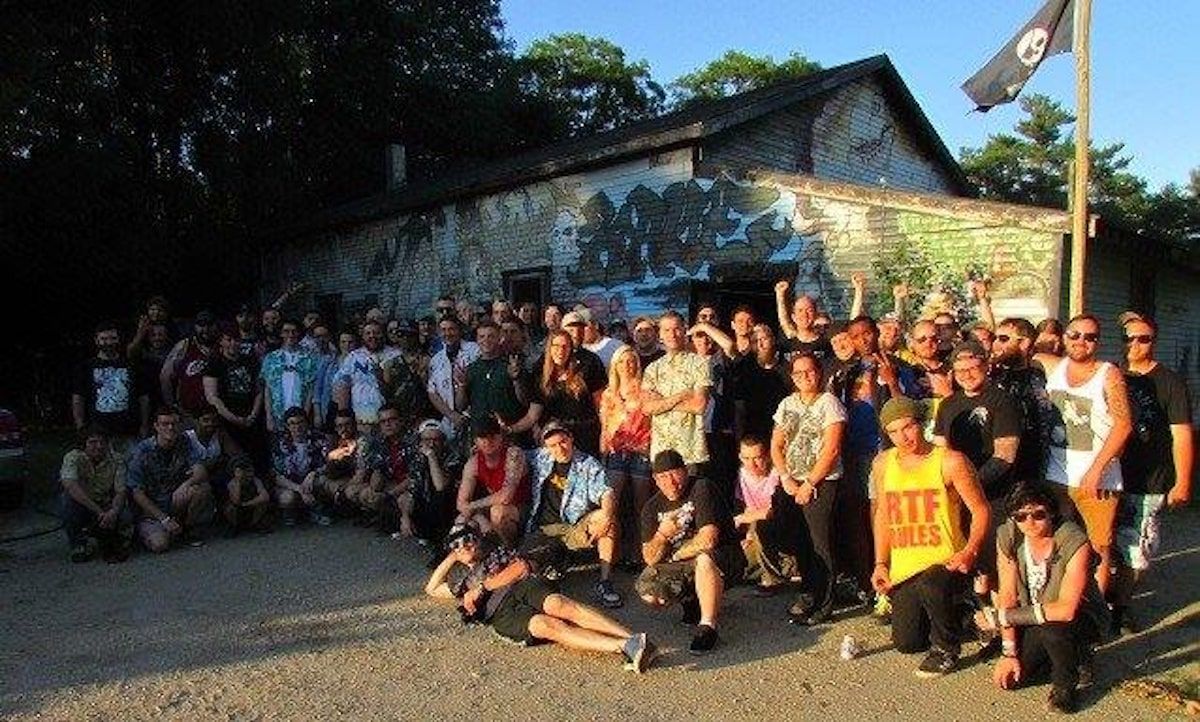
The Kave was in Bucksport, Maine (which some might call the middle of nowhere) and was run by Kathy Kave, who pretty much shouldered the weight of Maine Hardcore for so many years while it was open.
I think when the Kave closed it took Maine Hardcore a little bit of time to rediscover its identity, because we really took having something like that for granted. But now we’ve got a ton of cool stuff going on.
Squashed Warehouse run by Vic has that same “Kave” feeling that I missed so much, tons of cars packed onto someone’s lawn, hanging out outside between bands, knowing the bands who are visiting from far away have a place to crash and food cooked for them.
And then Chris Link has really picked up where Kathy left off in terms of getting awesome hardcore bands to Maine. I think he’s single handedly turned Maine back into a destination for bands that are on tour, and he’s giving local bands shows they can be really excited about and proud to play.
Any new bands from your area we should absolutely be checking out—especially ones that might’ve slipped under the radar in 2025?
I don’t think they’ll be slipping under any radar, but the new band I’m most excited about is called Retract.
Technically from NH, but our drummer plays in that band with other friends of ours and it’s awesome.
In addition to booking shows, Chris Link also puts out a lot of tapes and records for Maine bands and two of his more recent releases that are worth checking out are by Infernal Diatribe and Gumskab.
And then some of the guys in Infernal Diatribe also play in a sick emo band called Grief Mop.
A few more Maine bands are Manismurder, Gasoline Dream, Secret Work, Peacebreaker, and I’m sure I’m forgetting some obvious ones. Something that makes Maine unique is that no two local bands sound the same.
And the scene is big enough to where shows are well attended and high energy, but small enough to where we all really rely on each other to keep things going. Not only do I think that’s a cool aspect for a hardcore scene, but I think it makes our scene pretty resilient.
What keeps a hardcore scene alive in Maine?
I think it’s that resiliency that I was just talking about. I’ve been going to shows for about 16 years and there have been some really noticeable dry spells when you find yourself sort of asking “is it over”? And I think every time it’s proven that it’s not over, whether that’s Chris Link bringing Madball to town, or a new local band popping up that’s trying something new, it sort of comes back a little bit stronger than it was before.
I’ve always heard references to what other scenes influence Maine hardcore or that Maine is sort of an offshoot of Boston hardcore, but I think if you look really closely at what goes on here, it’s very much its own thing. You likely won’t go to many shows in Maine and hear five bands that sound alike. And I think that probably started years ago out of necessity – and of course there’s also the influence of Kathy’s ethos of inclusivity and giving every band a chance to play shows – but what that has really evolved into over time is something we strive for because it feels very authentic and true to the roots of Maine hardcore.
After being away for so long, how does it feel to plug back into the community—same faces, new blood, or a weird mix of both?
Definitely a mix of both, but I’d say more new blood than the same faces for sure. There will be the occasional show, like Madball last year, when a bunch of us look around and are like “hell ya, everybody’s here!” and those moments are really special.
But it’s even more special to see this influx of new people keeping it going. For us as a band, what’s been really cool is there’s this small group of people that went to our shows 8 years ago and are still around and incredibly supportive and then on the other hand there’s this group of people who I’m pretty sure might think we are a new band and not know we have a 10 year old demo and 9 year old 7″.
So the combination of the occasional “glad you’re back” mixed with the occasional “hey, that was cool I’ve never heard of you guys” really makes it feel like we are celebrating something old while trying something new.
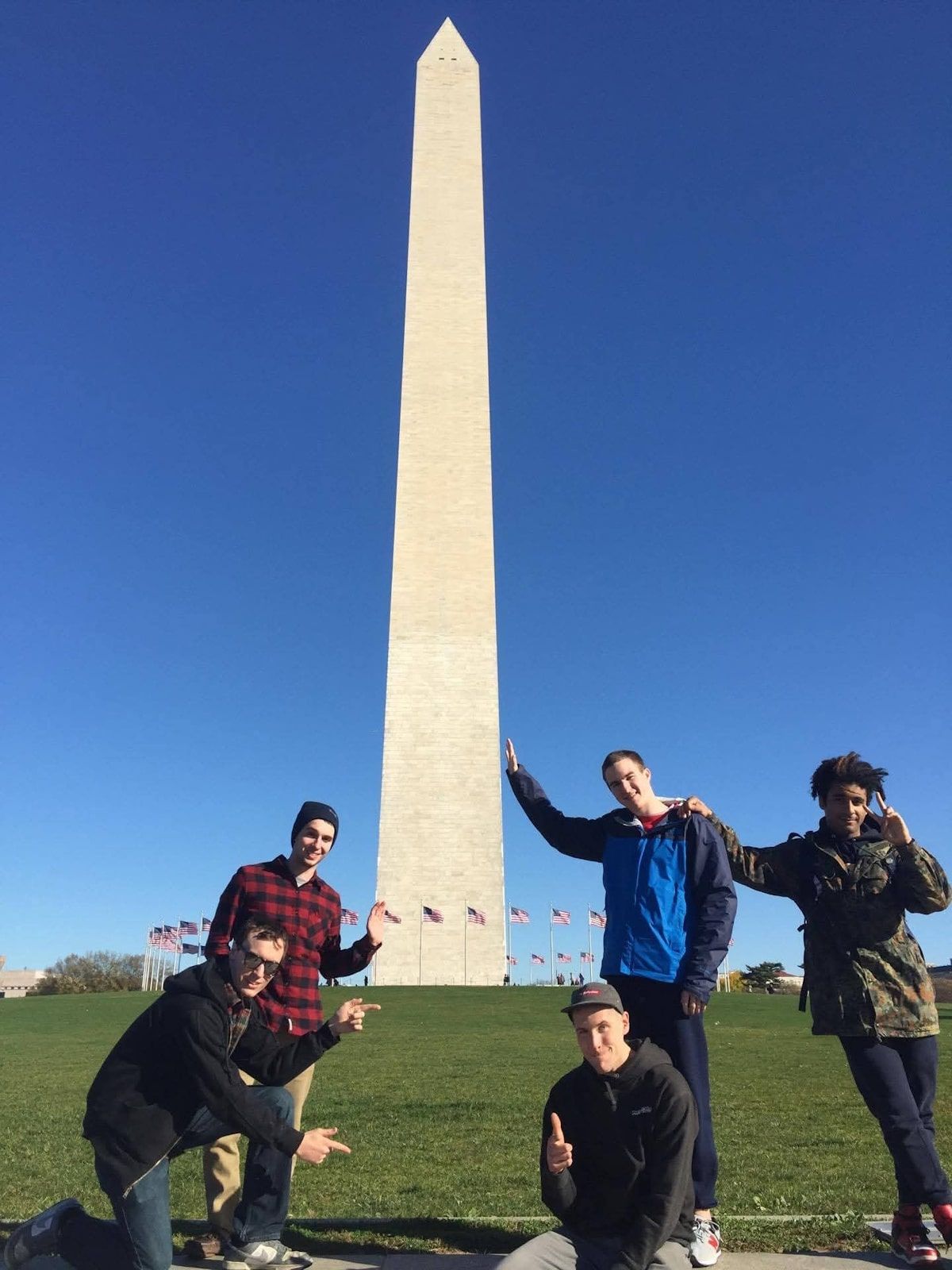
How does this new chapter for CORRECTIVE MEASURE feel compared to the first one—are you approaching it with a different mindset this time around?
I think this chapter has a feeling of mortality, if that makes sense. Chapter one was all about saying yes to ridiculous things like driving 8 hours to DC overnight for a single show, or driving 20 hours to Toronto and back in a 36 hour window to play Not Dead Yet Fest, or not knowing how to tour correctly and renting an SUV at the Bangor airport and hoping they wouldn’t notice or care that we put 5000 miles on it.
Chapter 2 is more about being realistic about what we can and can’t do and realizing the end is in sight, so what last memories can we squeeze out of this band? And then there’s also just the goal of having a positive impact this time around, whether that’s using merch proceeds to donate to things we believe in or just using what little platform we have to speak out about the things that really matter, whether it’s something close to home like trans rights in Maine, or the genocide in Gaza.
I think any time you are put in a position where you are holding a microphone in a room full of people who are willing to listen, you should take them up on that willingness. When this chapter of the band ends, I want there to be no mistaking what we believe in.
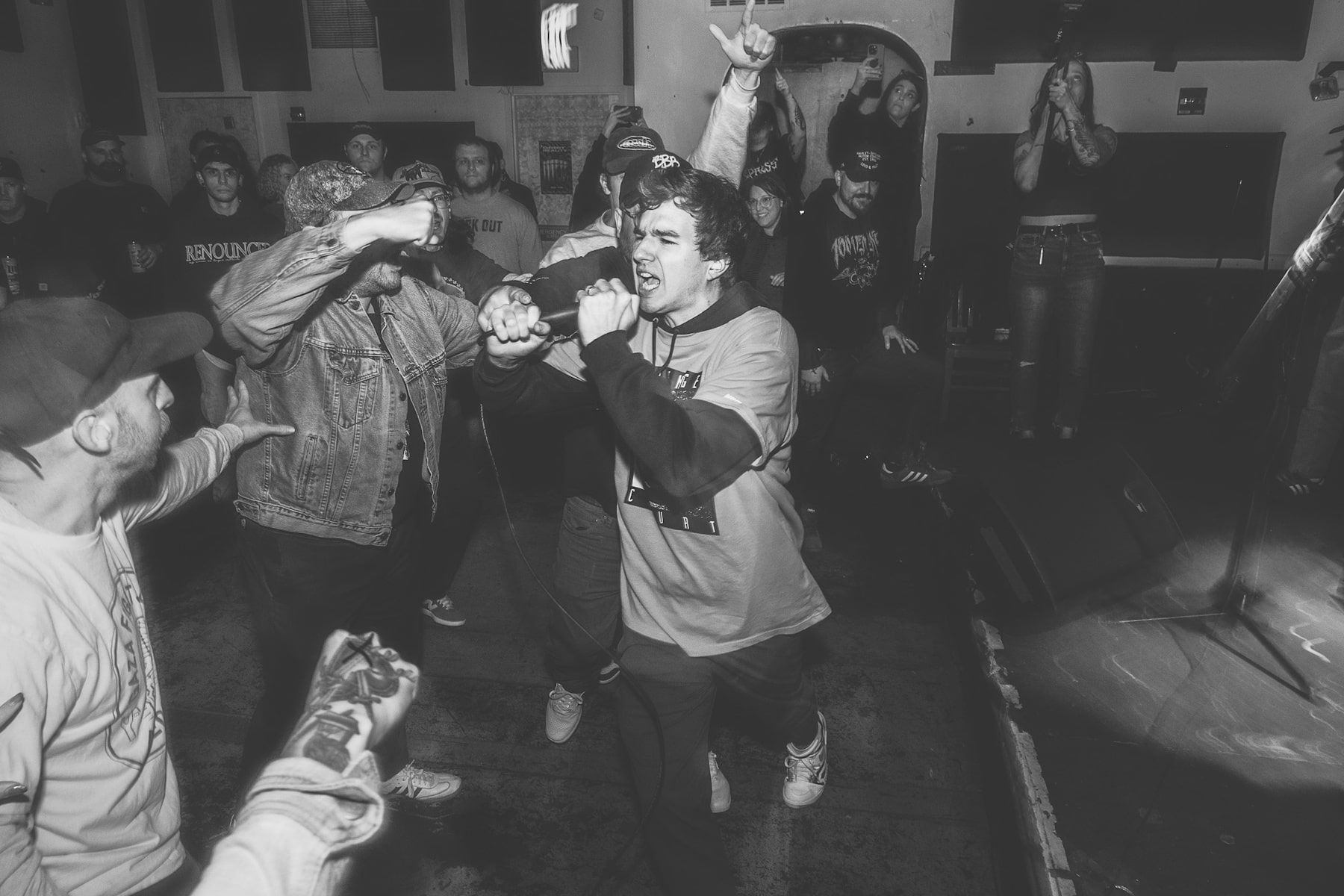
Looking ahead, is this a one-off burst, or are you thinking long-term again—more releases, shows, full commitment?
When we recorded the 12″ we knew that Seymour was moving away and wouldn’t be able to play in the band going forward, so the whole idea behind the 12″ was to get together one last time and try to create something together.
Now with Brandon and Pat in the band, we’ve got this second wind of wanting to write and play more. The Europe tour in October is something that Robert and I have been musing on since the 7″ came out on Refuse Records, and to finally make that a reality and to have Robert’s continued support feels like a culmination of all the goals we had set for ourselves a decade ago. We have plans to write more over the summer, and to keep playing shows for as long as we are asked to play them!
Sunday, Oct 19 — Germany, Leipzig
Monday, Oct 20 — Poland, Kraków @ Baza
Tuesday, Oct 21 — Austria, Wien
Wednesday, Oct 22 — Czech Republic, Praha @ Eternia
Thursday, Oct 23 — Germany, Cologne
Friday, Oct 24 — Netherlands, Amsterdam TBC
Saturday, Oct 25 — Germany, Berlin
Thank you so much for your time. Feel free to drop your final thoughts. Thanks!
Thanks so much for all the thoughtful questions! If you are reading this and it’s your first time hearing about Maine Hardcore, go listen to Wake Up Call and Outbreak!!



